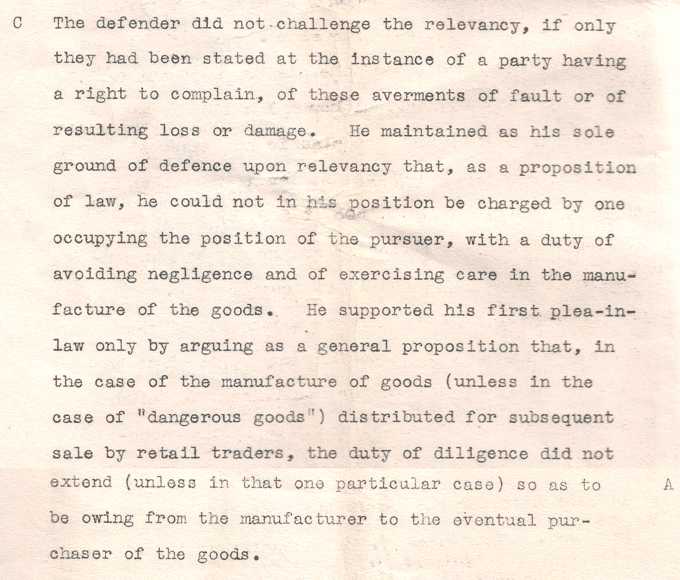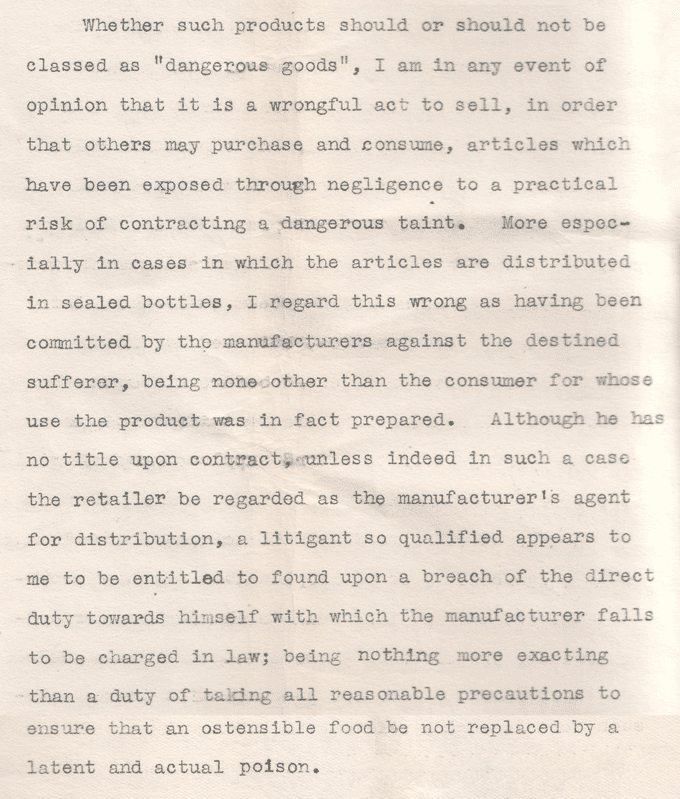| | Home | Resources | Schools Programme | Teachers | Site help | About us | Contact us | |
| You are here: Home > Resources > Lord Moncrieff's Opinion |
Lord Moncrieff's OpinionLord Moncrieff heard the case on 27th June 1930 and found in favour of Mrs Donoghue. His written opinion is 20 pages long and starts with an outline of Mrs Donoghue’s claim and a summary of David Stevenson’s defence. David Stevenson argued that he owed no obligation to the eventual consumer of his ginger beer, having had no contact or contract with her. If he had manufactured ‘dangerous goods’ then he could have been held responsible, but ginger beer did not fall into this category. 
Transcript:The defender did not challenge the relevancy, if only they (the claims) had been stated at the instance of a party having a right to complain, of these averments of fault or of resulting loss or damage. He maintained as his sole ground of defence upon relevancy that, as a proposition of law, he could not in his position be charged by one occupying the position of the pursuer, with a duty of avoiding negligence and of exercising care in the manufacture of the goods. He supported his first plea-in-law only by arguing as a general proposition that, in the case of the manufacture of goods (unless in the case of ‘dangerous goods’) distributed for subsequent sale by retail traders, the duty of diligence did not extend (unless in that one particular case) so as to be owing from the manufacturer to the eventual purchaser of the goods. (National Records of Scotland reference: CS252/2299) | |||
LiabilityLord Moncrieff explained the criteria that he believed were required to find the defender liable.

Transcript:Whether such products [foods and beverages] should or should not be classed as ‘dangerous goods’, I am in any event of opinion that it is a wrongful act to sell, in order that others may purchase and consume, articles which have been exposed through negligence to a practical risk of contracting a dangerous taint. More especially in cases in which the articles are distributed in sealed bottles, I regard this wrong as having been committed by the manufacturers against the destined sufferer, being none other than the consumer for whose use the product was in fact prepared. Although he has no title upon contract, unless indeed in such a case the retailer be regarded as the manufacturer’s agent for distribution, a litigant so qualified appears to me to be entitled to found upon a breach of the direct duty towards himself with which the manufacturer falls to be charged in law; being nothing more exacting than a duty of taking all reasonable precautions to ensure that an ostensible food be not replaced by a latent and actual poison. (National Records of Scotland reference: CS252/2299) According to these first principles Lord Moncrieff decreed that Mrs Donoghue should be allowed to proceed against David Stevenson for compensation and the facts of the case should be tested in court. | |||
Appeal to the House of LordsDavid Stevenson launched an appeal against Lord Moncrieff’s conclusions regarding his breach of duty, and the judges of the Second Division of the Court of Session, looking back to previous similar cases and seeing no precedent for the manufacturer having a duty to the consumer, found in his favour. Although Scotland and England have separate legal systems, both have, as their last resort, an appeal to the House of Lords. So May lodged a petition in the House of Lords on 25th February 1931. Her appeal was discussed before five lords on the 10th and 11th December 1931. The majority of the lords agreed that, under both Scots and English law, the manufacturer of an article of food or drink, sold in circumstances which prevented the distributor or the ultimate purchaser or consumer from being able to discover any defect, is under a legal duty to the ultimate purchaser or consumer to take reasonable care that the article will not cause injury to health. They upheld May’s right to take action against David Stevenson by identifying a relationship between the manufacturer and the consumer, regardless of whether there had been direct contact or a contract between the parties. Lord Atkin’s speech in this appeal has become famous because he focussed on a moral argument which has become known as the 'neighbour principle', based on the Story of the Good Samaritan as related in the New Testament. Lord Atkin said that a manufacturer must take reasonable care to avoid acts or omissions which he or she could reasonably foresee would be likely to lead to the injury of ‘your neighbour’. David Stevenson should have ensured that the drinks bottled in his factory were safe and if he had failed to do so, then he should be held responsible for that failure. May Donoghue should therefore be allowed to proceed against him for compensation and the facts of the case (ie. whether there had been a snail in the bottle of ginger-beer, whether the bottle had come from David Stevenson's factory and whether the snail had caused May Donoghue's illness) should be established in court. Mrs Donoghue had been successful in her appeal and the next step should have been for her to prove in court that there had really been a snail in her ginger-beer (which David Stevenson vigorously denied) and that it was the snail which had caused the ill health that she had suffered. The case was scheduled for January 1933. Unfortunately David Stevenson died in 1932. Mrs Donoghue’s claim was settled out of court and therefore the facts of the case were never established. |
|||
Records of the House of Lords Appeal:The Parliamentary Archives in London contain the papers and petitions relating to Mrs Donoghue’s appeal (Parliamentary Archives' references: HL/PO/JU/4/3/873, HO/PO/JO/10/10/965/2526 and HL/PO/JO/10/10/965/2527a). |
|
|